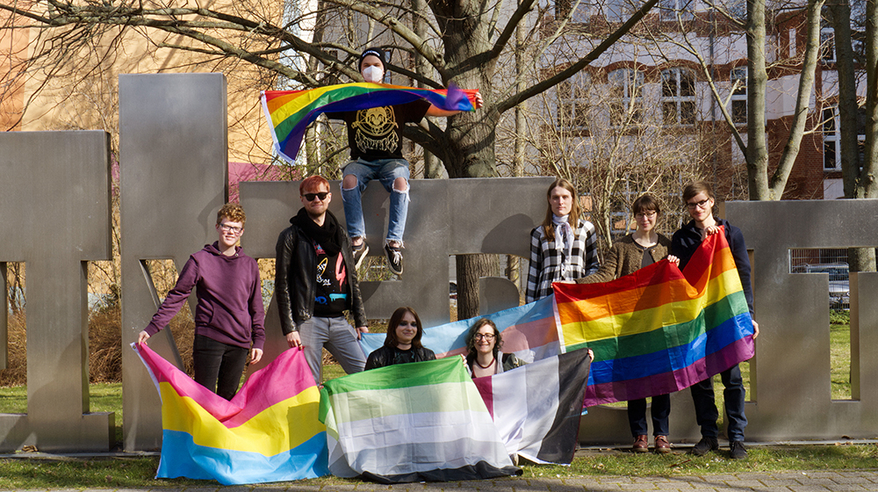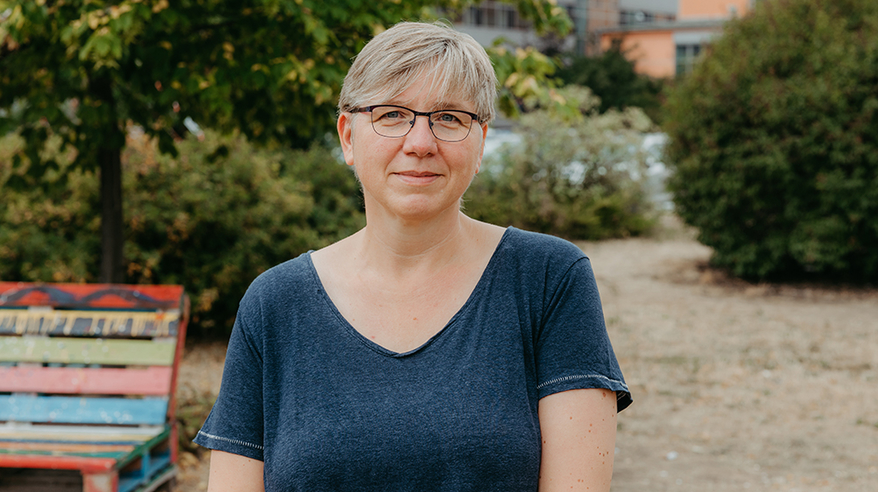
At the beginning of June, a rather unusual topic was on the agenda of our regular team meeting: It was about the toilets in our department. More precisely, it was about changing the binary separation of the men's and women's restrooms. To this end, we had received new signs from the Equal Opportunity Office, stating that the restrooms are now accessible to all genders. The reactions in the team were mixed. Some - like me - were a little uncomfortable at the thought of going to the restroom with male colleagues in the future. Others didn't care. Some actively campaigned for it. And as I listened to the arguments of those in favor of the change, I thought to myself, "God, am I too uptight?!"
As a child, we learn that we either go to the women's or the men's restroom. And that's how we do it then. Throughout our lives. Because that's the way it is. But what if I don't feel like I belong to my birth gender? What if there is no either… or… for me, but an in-between? Anna, Stella and Bolli know from their own experience how many challenges the simple division into female and male brings with it. The three work or study at OVGU. All three are transgender, which means they are not comfortable with the gender they were assigned at birth. And therefore, not comfortable with going to the bathroom they "should" go to according to social convention. "Before I started my transition, I had to go to the men's room. It was never comfortable because I'm a woman. That's why I always held out until I got home," Anna recalls. With an eight-hour workday, it was a real test for the research assistant and her bladder. A gender-neutral toilet would have made her everyday life much easier.
Up until today, there are only four of them at the entire university, in the faculty buildings of Computer Science and Humanities - out of 374 sanitary facilities in total. With around 2,000 employees and more than 13,000 students, many students think that's too few. That's why the queer groups OVGUPride, the university's QueerCampus and the AG Queer2 of Magdeburg-Stendal University have written an open letter. "We are not at all concerned with all WC's being gender neutral - I can well understand that people would feel uncomfortable if it were. After all, I also feel uncomfortable when I have to squeeze in somewhere where I don't fit at all," explains Stella, who is active at OVGUPride. They would like to see two or three toilets per building for everyone, which would already have an important signal effect. They would show that there is not only male and female. They would prevent those concerned from always having the feeling like they do not belong there when they use the toilet, because they do not fit into the binary system.

Students of queer groups from the University of Magdeburg and Magdeburg-Stendal University of Applied Sciences campaign for more equality. (Photo: private)
Like Bolli. According to his birth certificate, Bolli is a man and therefore goes to the men's room - as he learned in his childhood. For everyone else, that fits. Not for Bolli. "I'm non-binary, so I don't assign myself to the two-gender system. That's why I feel bad when I have to go to that restroom, because it's just the wrong one," Bolli explains to me. Bolli is involved in the Faculty of Computer Science's Awareness Department and in getting more gender-neutral restrooms installed at the university - but not all of them, because "restrooms are also a safe space, and we definitely want to keep it that way. It makes the most sense to just have enough of everything and provide an appropriate restroom for all groups of people."
So there I sat, listening to the stories of the three and realizing that just because I want to continue to go to a women-only restroom, it does not mean I'm uptight. I just feel most comfortable in that comfort zone. And it's exactly this comfort zone that should be made possible for everyone - with the simple addition of a few new signs in all buildings.
Small changes with a big impact
A much greater challenge, however, are the structural disadvantages that are not apparent at first glance. Especially in administrative processes - starting with the application or enrollment. We don't even manage to adapt the language on our forms; most of them only say "head of the institution" or "dean” (the connotation in German is only male). And changing a form like that is actually done quickly," Sandra Tiefel explains to me uncomprehendingly. "But such a small change has a big impact on role models. If I always read that there are only male supervisors, then I might not get the idea that I, as a woman, can also become a supervisor." But that's not a problem at the university alone, she says, but a societal one: success and influence simply have a male connotation in our country. "In certain leadership positions, we expect men, and we carry that within ourselves," the former Equal Opportunity Officer knows.
 As former Equal Opportunities Officer at the University of Magdeburg, Sandra Tiefel knows the challenges of gender equity. (Photo: Jana Dünnhaupt / Uni Magdeburg)
As former Equal Opportunities Officer at the University of Magdeburg, Sandra Tiefel knows the challenges of gender equity. (Photo: Jana Dünnhaupt / Uni Magdeburg)
Stella, Anna and Bolli have had similar experiences. When it comes to forms, they often only have the choice between male or female. There is no other option. "I myself am currently in the phase in which I am only consolidating this decision for myself. So sometimes I sit in front of a simple form for ten minutes and don't know what to select," Stella, who identifies as non-binary, confesses to me. Even for trans people who have not yet gone through their legal transition, the bureaucratic processes at the university present many challenges. For example, they currently cannot provide a name of their own choosing when they register or easily change it later. "The entire system is simply not designed for names or even genders to change over a lifetime," Anna remembers too well. "It was explained to me at the time that my data in the IT system can only be changed once the court ruling on the change of name and civil status is enacted; because otherwise the systems for paying wages and social security contributions will probably get messed up." As Sandra Tiefel tells me, at least this is also going to change at the university soon - the legal basis for it was just freshly brought on the way by the German parliament. It will soon be possible to use the new name even though it has not yet been officially registered. For those affected, this is a great emotional relief, because while they already appear with the new gender, they still have to live with the old name in everyday university life.
"The Equal Opportunity Office is concerned that gender should not play a role," emphasizes Sandra Tiefel. "To do that, we have to sharpen the perception of gender discrimination. We have to get to the point where we no longer notice whether someone is male or female. We have to be able to respond to individual needs; without having to define someone in advance based on their gender, skin color or religion. If people have problems at our university, we should solve them together with them - without opening up problems for another group of people. By setting up some gender-neutral restrooms, we could show how easy it is to do that."
*dey = a possible pronoun for people who identify as non-binary
